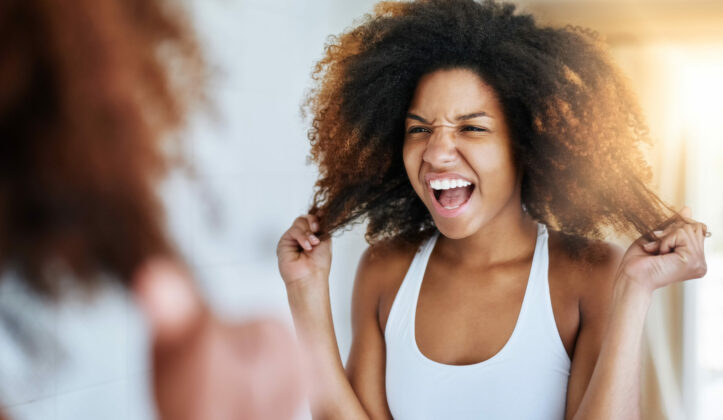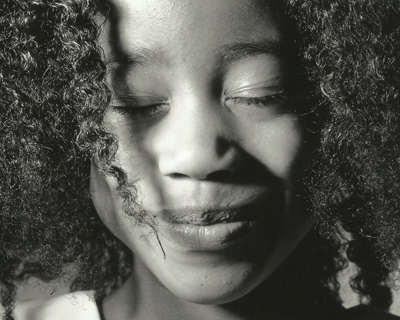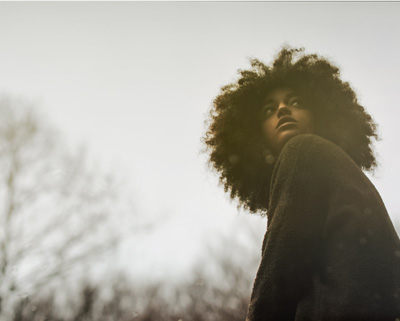Hair To Toe
Trichologists and Tresses
Editorial Team

I had the pleasure of chatting with a black, female trichologist to discuss hair and the scalp, specifically for our health and hair. A trichologist is a professional who specializes in the structure, function and makeup of the scalp and hair. They do tons of clinical observations, clinical residencies, home studies, testing and certification classes in addition to completing several years of coursework to become a certified trichologist. I thought it would be nice to kick off the Alchemy Oil launch with some helpful information formulated specifically for us, as well as tips to ensure we are caring properly for our hair.
The most important thing to remember is all things start from the inside and any growth you are seeking must start with taking care of yourself from within. Hair growth support from within comes first from regular water intake and then from vitamins and nutrients that contain biotin, iron, B12 and vitamins D and C. Most nutrients ingested go first to the essential systems in our bodies, which means the integumentary system, which consists of the skin, hair, nails and exocrine glands, get what’s left over. You should be aware of your protein levels and nutrient intake. Hair is mostly made of protein, so protein-rich foods are imperative for your body and hair. Some foods ranked highest in protein are: black beans and lentils, eggs, Greek yogurt, oats, guava, broccoli, fish and pistachios. The list is pretty lengthy. You can find variations of these lists online or by asking your health care provider for the top 10‒20 foods.
The energy to form cells specifically for the hair decreases about four hours after consuming food, so snacking regularly on healthy, protein-rich foods like fruits and grains cannot only help your hair cells, but energize your body as well.
Next we discussed how much love we should give our hair. We hear terms like hair masks, scalp massages and hair pamper parties being used in beauty magazines and blogs (Alchemy Oil is in the process of developing a line of all-natural hair masks), but how important is the spa treatment for our hair? The answer is to treat your tresses and scalp just as you would your face; one should have a hair and scalp regimen. Regularly massaging the scalp using oil and your fingers or a scalp massager is key for stimulating the blood circulation to your head and promoting hair growth. Scalp massages can also increase hair thickness through stretching the follicles. Hair masks that are natural are great to apply at least 20 minutes before a wash. Intensive moisturizing masks that include ingredients like avocado, coconut, bamboo etc., are great ingredients to deliver nutrients externally to the hair biweekly.
The biggest question women of color have is how much touching, styling and coloring is too much?
Touch your hair and massage it, brush and comb it to keep it from tangling, and moisturize it regularly but shy away from excessive touching and styles that pull tightly on your hair. Avoid tight pulling around your edges and the soft middle part of the head and finally, try not to dye hair more than every eight weeks. If you have color in your hair, ask your hair care specialist to provide you with a recommendation for a pre-shampoo conditioning treatment.
A lot of black women report suffering from dry, itchy and/or flaky scalp. I always assumed it was because our scalps are just naturally dryer, but a flaky scalp can be damaging to our scalp tissue and even cause breakage! Who would have thought certain foods can contribute to a dryer scalp? If you have a dry scalp, you can do things such as assess your diet and experiment to see if the flaking lessens with eating/drinking less of foods known to increase dryness, itching and flaking. Diets high in sugar and processed fats, full-fat dairy products and Champagne, white wines and other alcoholic beverages (I know, ladies, paint n’ sip may become paint n’ sip one glass very slowly), can intensify the itching and flaking.
One of the more important tips is to not constantly switch hair products, specifically shampoos and conditioners (you know we love our hair routine drawer full of hundreds of bottles). Dandruff-like residue can also be a buildup of conditioners and shampoos not rinsed properly as well as excessive use of thick greases, holding sprays, gels and pomades. Wearing protective hairstyles and not washing hair while in these styles regularly, as well as wearing protective styles longer than recommended, can trigger flaking and itching. Piling up products in your hair while in protective styles can also cause scratching, irritation and flakes.
Black women often mistake buildup for dandruff due to not regularly cleaning the scalp and washing hair, using thick styling and holding products and improperly washing and moisturizing the scalp. Damaging chemicals found in hair products that promise “straighter hair” and “better texture,” often contain chemicals that can irritate the scalp as well.
If you have a consistent issue not caused by any of the above, you may have dandruff or another scalp-related issue. There are multiple things that can cause dandruff including: yeast, dry skin (not everyone with dry skin can or will develop dandruff), diet and other fungi such as Malassezia. These should be looked at and diagnosed 100% by a professional. That is where a trichologist comes in!
Key takeaways from speaking with the trichologist:
- Water and diet are imperative to hair and scalp health.
- Having a hair and scalp regimen is needed and encouraged.
- Hair masks are great for the hair and can be used before washes; avoid masks with chemicals in them and look for vitamin-packed masks made with fresh, natural ingredients.
- Lay off the excessive pulling and breakage-triggering hair ties and hair styles.
- If you have color in your hair, ask your stylist for the best products to deliver nutrients to your hair, protect your color and offer healthy conditioning treatment.
- If you have some flaking, dryness and itching, take a look at your diet and investigate if you are eating foods that could trigger these symptoms.
- Stop switching hair products! If something works for you, use it and create a routine; wash your hair regularly and use the same products.
- Thoroughly rinse hair when washing and conditioning it.
- Avoid the use of thick greases, holding sprays, gels and pomades. If you want to continue using them, use in moderation and ensure they are completely rinsed out in a timely manner.
- Wear protective styles for recommended time only; wash hair in protective styles to keep hair clean and healthy.
- While wearing protective styles, do not pile up hair products that can get stuck and build up in the hair and on the scalp.
- If you are suffering with more than occasional flaking, itching and dryness, please contact a professional for an examination and assessment.
Share your thoughts and join the conversation. Always feel free to comment.
Previous posts
-
You are so welcome! I’m glad it was informative and you got some gems from it; please check back monthly for new blog updates and posts under our “Hair to Toe” blog. If you ever have a question submit an “Ask Alex” form and I will post it on that blog to get a conversation going- happy Saturday!
















Very very informative. Thank you, Queen, for the time spent gathering this knowledge and sharing it. \r\nI especially took away the fact that all nutrients we give to our body by ingesting goes to our skin, glands, scalp and hair last and what may remain. Excellent point that I didn”t realize nor actually know, but makes so much sense.